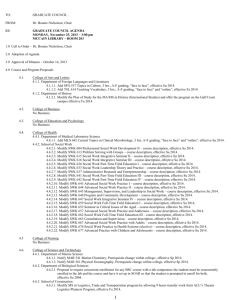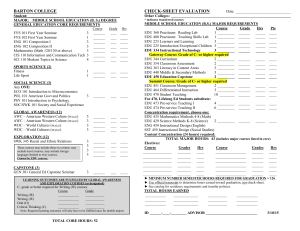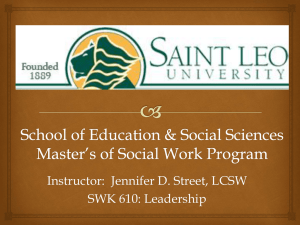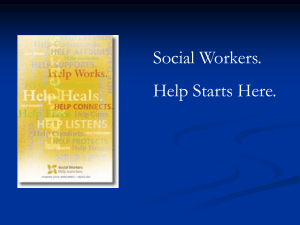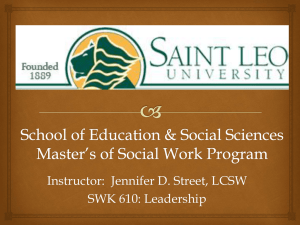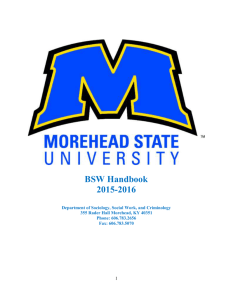MSW Description of Courses
advertisement
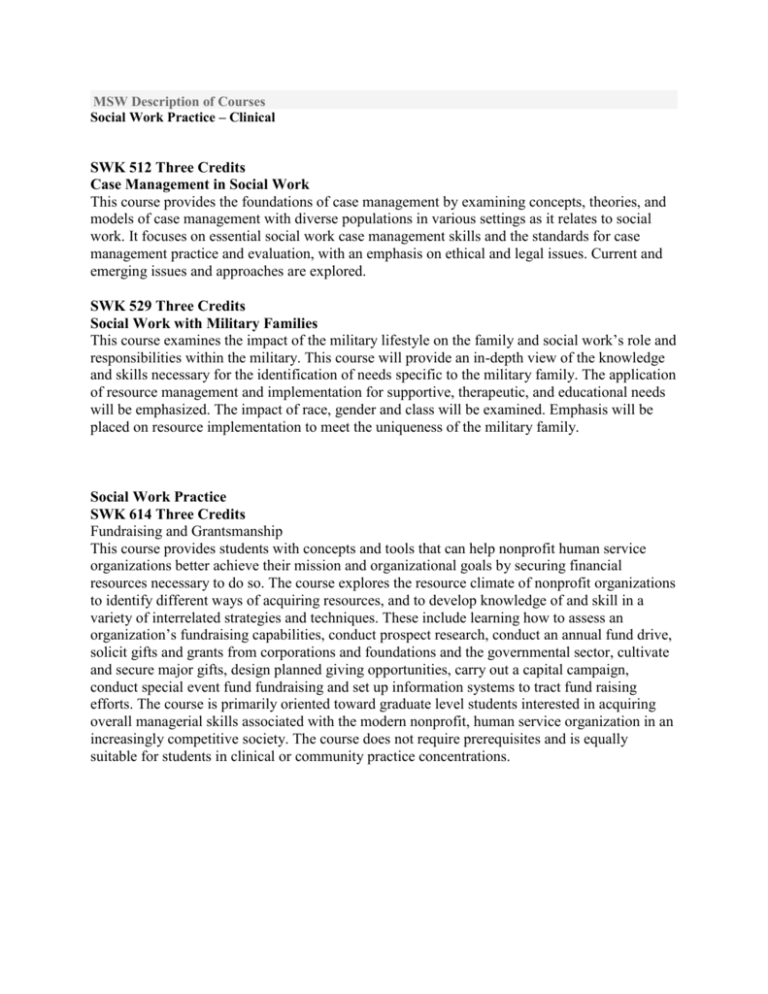
MSW Description of Courses Social Work Practice – Clinical SWK 512 Three Credits Case Management in Social Work This course provides the foundations of case management by examining concepts, theories, and models of case management with diverse populations in various settings as it relates to social work. It focuses on essential social work case management skills and the standards for case management practice and evaluation, with an emphasis on ethical and legal issues. Current and emerging issues and approaches are explored. SWK 529 Three Credits Social Work with Military Families This course examines the impact of the military lifestyle on the family and social work’s role and responsibilities within the military. This course will provide an in-depth view of the knowledge and skills necessary for the identification of needs specific to the military family. The application of resource management and implementation for supportive, therapeutic, and educational needs will be emphasized. The impact of race, gender and class will be examined. Emphasis will be placed on resource implementation to meet the uniqueness of the military family. Social Work Practice SWK 614 Three Credits Fundraising and Grantsmanship This course provides students with concepts and tools that can help nonprofit human service organizations better achieve their mission and organizational goals by securing financial resources necessary to do so. The course explores the resource climate of nonprofit organizations to identify different ways of acquiring resources, and to develop knowledge of and skill in a variety of interrelated strategies and techniques. These include learning how to assess an organization’s fundraising capabilities, conduct prospect research, conduct an annual fund drive, solicit gifts and grants from corporations and foundations and the governmental sector, cultivate and secure major gifts, design planned giving opportunities, carry out a capital campaign, conduct special event fund fundraising and set up information systems to tract fund raising efforts. The course is primarily oriented toward graduate level students interested in acquiring overall managerial skills associated with the modern nonprofit, human service organization in an increasingly competitive society. The course does not require prerequisites and is equally suitable for students in clinical or community practice concentrations. SWK 626 Three Credits Human Behavior in the Social Environment This course is an introductory course that involves the study and exploration of human behavior, and provides a framework for understanding individuals, families, groups, organizations, and communities within the context of interacting physical and social environments. Human behavior is seen as varied and complex, arising from the interplay of a number of factors (biological, psychological, social, and cultural) which can enhance or impede the social functioning of individuals and social institutions. Traditional and alternative theories and paradigms will be utilized to provide the foundation necessary for organizing and understanding human behavior in the social environment. Special emphasis is given to human diversity, the impact of social and economic forces on individuals and social systems, and populations at risk. SWK 639 Three Credits Ethnicity This course is concerned with the particular development of ethnic, racial, religious groups, and cultural diversity in America. Theories of ethnicity, race, religion, and intergroup relations, their relevance to social work, the functions of and models for their study, derived from social research, are examined. Social issues, models for intervention designed to ameliorate unjust and oppressive conditions, and the impact of America’s pluralism are explored. Concepts of culture, ethnicity, race, religion, prejudice and discrimination, and their influence on social welfare programs and social work practice are emphasized. Included are examination of ethnocentrism, racism, intergroup conflict, segregation, and other practices that have profound impact on the education, health, housing, employment, crime and delinquency, and mental and emotional health of individuals, families, groups, and communities. SWK 651 Three Credits Social Welfare Policy and Services One of the functions of Social Work has been, and is, to develop, maintain, modify, and strengthen the social welfare system so that it can meet basic human needs of a culturally diverse population. A method institutionalized with professional social work education and practice for fulfilling this vital mission is social welfare policy analysis and planning. This concerns the formulation, development, implementation, and evaluation of relevant social plans, policies, programs, and legislation designed to promote individual and societal well being; to prevent or resolve social problems, alleviate social injustice, develop human and social resources; and, generally, to enhance the quality of life for all segments of society. The purpose of the course is to provide students with the necessary knowledge, skills, and values to perform as informed and competent practitioners, and to contribute towards change and social justice, making social welfare institutions more humane and responsive to the needs of a diverse population. SWK 663 Three Credits Trauma and the Military. The focus of this course is to identify and understand the range of physical and emotional consequences of trauma that have been experienced by some active duty military personnel, veterans, reservists, and non-combatants (e.g. chaplains, medical staff) and their families. A major emphasis of this course is learning to identify risks and resilience factors and to provide empirically-informed treatment to service men and women and their families who have experienced trauma. The course aims to sensitize students to social work's commitment to respecting diversity among persons. Special issues of social work practice with minority populations especially women, persons with disabilities, people of color, college students, and lesbian, gay, bisexual, or transgendered persons are addressed. SWK 675 Three Credits Social Work Profession- concurrent enrollment in SWK 690A This course develops the knowledge, values, and skills that form the foundations for social work practice. It includes perspectives, processes and skills considered generic to practice, i.e. generalist, diversity, strengths and empowerment. It develops principles and skills for generalist practice in the contexts of diversity, social justice, professional competence, and in particular, but not limited to, the African-American experience. It uses the case study method and laboratory skill learning to focus on the phases of practice (preliminary, beginning, work and ending) with individuals, families, groups, and communities. Special emphasis is placed on the generic application of the skills: the engagement, data collection, assessment, intervention (or work), evaluation and, the termination (ending) phases of the social work process. Client systems’ strengths, capacities, and resources will be examined in their environmental context. SWK 690 A&B Three Credits Each Field Practicum I Corequisite: Enrollment in a social work practice method course. The Field Practicum I educational experience provides students with the learning opportunity to engage in supervised social work practice in human services settings. Students learn to apply the foundation knowledge and skills obtained in the classroom to actual practice situations that involve individuals, families, groups, communities, and organizations. Upon successful completion of the Field Practicum I experience, the student will be able to conduct competent assessments that recognize issues of diversity and strengths, develop intervention plans, implement basic intervention techniques, and evaluate practice outcomes from a generalist and ecosystems perspective. SWK 697 Three Credits Research Methods I Prerequisite: Successful completion of an elementary statistics course. This course is designed to impart knowledge and skills of scientific social investigation. Scientific methods of knowledge building for social work practice, as well as practice evaluation and research outcome utilization, are emphasized. This course covers scientific inquiry and theory, the ethics and politics of social work research, problems and hypotheses, operationalization and measurement, research designs, sampling, data collection and analysis, reporting results, and utilization of research outcomes. SWK 698 Three Credits Research Methods II Prerequisite: SWK 697 This is an advanced research course which focuses on research designs and analytical skills for the systematic evaluation of clinical social work practice. It covers the social and ethical context of practice research, as well as a variety of methods for practice evaluation. The utilization of quantitative and qualitative methods for data analysis is taught. SWK 714 Three Credits Differential Approaches to Treatment Prerequisite: Successful completion of all practice courses and concurrent enrollment in SWK 790B This course is designed to examine selected approaches to intervention used by social work professionals in work with individuals, families, and groups in a variety of settings. The theoretical base, essential values, major techniques, and roles of the worker of each selected approach will be reviewed in the context of their efficiency and demonstrated effectiveness for diverse populations. The course builds upon content in the foundation, clinical concentration, and field practice experience arenas. It serves to facilitate the integration of theory and practice and provides social workers with a sound base for arriving at differential assessments and differential plans of intervention which incorporate a social mechanism for evaluating the outcomes. This course serves to be a major integrative course within the clinical concentration. SWK 715 Three Credits Intervention Strategies with the Military The major emphasis of this course is learning to provide major treatment options to service men and women and their families. The course sensitizes students to social work's commitment to understand and appreciate the strengths of military personnel, including those who have been deployed, those who have not, and their families. SWK 730 Three Credits Differential Assessment for Social Work Practice Prerequisite: SWK 626, SWK 690A, or equivalent. This course is designed to provide the social work student with a comprehensive body of knowledge essential for practice with diverse populations. Concepts of mental health, mental illness, and mental retardation, with a view of mental health and mental illness as a continuum, are explored. Traditional classification systems and newer approaches in use in clinical practice are discussed. An exploration of comparative theories and therapeutic approaches is included. SWK 736 Three Credits Substance Abuse The purpose of this course is to provide students with clinical and/or administrative professional goals an opportunity to attain an essential knowledge and skill base necessary for successful program planning, service delivery, and evaluative practice with people involved in substance abuse. This course is designed for individuals with little or no prior knowledge in this area. SWK 753 Three Credits Social Work in the School Prerequisite: SWK 651 This course focuses on social work practice in the educational setting. There will be an overview of historical developments, educational policy and planning, and implementation of social work service delivery. It will address the role and function of school social workers in elementary, middle, and high schools. The special education process, the policies mandated, and the needs of at-risk students will be examined. SWK 757 Three Credits Policies and Services for Aging Prerequisite: SWK 651 A comprehensive analysis of policies and services for senior citizens will be covered in this course. Students will examine factors leading to present policy as well as those which may indicate future trends. SWK 759 Three Credits Community Mental Health Policy and Services Prerequisite: SWK 651 This course emphasizes historical and current policies and services for mental health in the United States. Trends, impact, and outcome of policies will be evaluated. Specific attention is given to the funding of mental health care and to implications of a national movement to ensure legal rights for mentally disabled persons. SWK 760 Three Credits Child Welfare Policies and Services Prerequisite: SWK 651 The content of this course includes an in-depth study of services and programs affecting the security and development of children. The roles of parents and spokespersons are examined, as are current trends in children’s legal rights and education for the exceptional child. Special attention is given to developments which may be anticipated in the next decade. SWK 761 Three Credits Military Policy and Services SWK 761 builds on Social Welfare Policy and Services (SWK 651) and incorporates information from Human Behavior in the Social Environment (SWK 626). This is a graduate level course and builds on generalist social work courses and first year policy courses in the Master Social Work two year curriculum. The focus of this course is learning policies that directly functions of the military. The major emphasis of this course is learning to identify and advocate for benefits, and work toward changes in policies that impact treatment services and benefits that military personnel and their dependents receive. The course sensitizes students to ways social work interfaces with clients’ and families’ day-to-day functioning whether they have non-combatant, reserve, active duty, or veteran status. This course is designed to teach students (1) how to understand how the military culture shapes clients’ lives and (2) how to advocate for military personnel who need access to benefits to which they are entitled. SWK 762 Three Credits Community Organization This course is designed to introduce students to the dynamics of organizational and community change and transformation. The focus is on imparting knowledge and skills in systematic problem solving steps to bring about planned change that will result in achieving sound socioeconomic well-being. SWK 763 Three Credits Social Planning Prerequisite: SWK 762 This course is designed to introduce students to the salient principles, methods, processes, techniques, and various models of social planning. The knowledge and skills acquired from the course will prepare students to make systematic assessment and evaluation of community problems, and to design and implement effective programs to deal with such problems. The focus is on providing refined knowledge and skills in social planning. SWK 764 Three Credits Social Service Administration Prerequisite: SWK 762 (or permission of instructor) Utilizing a diversity perspective, the course is designed to make creative application of administrative and organizational management knowledge and skills to foster cooperative partnerships among various community agencies, including local, state, and regional social service organizations. The aim is to find a method of providing effective social services to diverse populations and various client populations. The focus is on providing pertinent knowledge and skills in administration and organizational management, financial management, supervision, budgeting, and coordination. SWK 771 Three Credits Social Work with Individuals Prerequisite: SWK 675 and concurrent enrollment is SWK 690 B This course focuses on social intervention with individuals. A multi-faceted format will be used to study the theories, their behavioral sciences empirical supports, value bases, and effectiveness with problems faced by individuals. This course will be conducted as a seminar, and is designed to incorporate a high level of participation by students. SWK 772 Three Credits Social Work with Groups Prerequisite: SWK 675 and preferably SWK 771 and concurrent enrollment in SWK 790A This course develops theory and skills for social work with groups, especially as applied to direct practice with diverse populations. It focuses on the therapeutic factors in group process and the functions and skills of the social worker in facilitating group process on behalf of members. Special emphasis is placed on diversity-sensitive application of aspects of models for facilitating empowerment processes in groups. The course includes experiential learning in three separate groups: group skills laboratory, process group, and task groups. SWK 773 Three Credits Application of Group Skills Prerequisite: SWK 772 This course builds on the process model of SWK 772 to advance the application of theory and skills for clinical social work practice with groups. The advanced nature of this course includes 1) more in-depth attention to theory and skills for facilitating groups for therapeutic purposes; 2) more sophisticated application of action and process-based techniques to the stages of group development and to the cultural diversity of members in therapeutic groups; 3) more comparative assessment of the types of/and models for social work practice with groups in diverse contexts; 4) more intensive experience in a group process designed to increase awareness regarding current strengths and obstacles to the “use of self” in clinical social work practice with groups. SWK 775 Three Credits Social Work with Families Prerequisite: SWK 771 and concurrent enrollment in SWK 790 A This course is designed to provide students with knowledge of the theoretical concepts and treatment approaches that are unique to the modality of family therapy. It draws upon a basic knowledge of the family in context from sociological, cultural, anthropological, historical, and systems perspectives. The family as a natural social system will be viewed primarily from the multisystems, Bowenian, Communication, Structural, and Solution Focused models.. Other models will be addressed. SWK 783 Three Credits Advanced Social Work with Families Prerequisite: SWK 775 This course is designed to enhance the student’s assessment and intervention skills and to expose students to the competency-based (strength oriented) approach to family therapy. Special attention will be given to gender issues and families from diverse cultures. The course builds upon content previously experienced by the student in the clinical methods foundation, ethnicity, the advanced curriculum and field experience. Primary emphasis will be placed upon students obtaining and demonstrating skills and techniques. Thus, role play, case presentation and an analysis of pre-recorded video tape will be extensively employed. SWK 789 Three Credits Research Practicum Prerequisite: SWK 697 and permission of instructor supervising or conducting the investigation This course involves the individually supervised practice in the application of research methods and tools to a specific social welfare problem, which may be indicated by students, generated by faculty and/or social agency. Research may include historical/bibliographical study methods. SWK 790 A & B Six Credits Each Field Practicum II Prerequisite: SWK 690 A & B. Corequisite: Enrollment in a social work practice method course. The Field Practicum II educational experience provides students with the learning opportunity to engage in supervised Clinical Practice or Community Development upon successful completion of Field Practicum I and all prerequisite courses. The Field Practicum II experience builds upon the knowledge and skills obtained in the foundation courses and Field Practicum I, and gives students the opportunity to develop advanced practice skills in clinical or community development social work practice. Field Practicum II for the clinical practice concentration affords students the learning opportunity to engage in advanced direct practice techniques for working with diverse individuals, families, and groups. Community Development Field Practicum II affords students the learning opportunity to engage in macro practice techniques for working with diverse communities and organizations. In addition, Field Practicum II provides clinical practice and community development student’s in-depth practical experiences for utilizing a variety of theories of social work to guide and evaluate practice SWK 797 Three Credits Evaluative Research Prerequisite: SWK 697 This is an advanced research course to acquaint students with theories, process, techniques, and context of evaluation, as well as program evaluation, such as intervention planning, research designs, monitoring of operation, assessment of impact, and efficiency/effectiveness of the service program. SWK 799A & SWK 799B Three Credits Each Thesis I & II Prerequisite: SWK 697 The content of this course includes the planning and carrying out of a research project on a social welfare topic with emphasis upon the total planning and implementation. One or more students may work on a project with an approved proposal. The final report must be approved by the Thesis Committee. (Selected twice for a total of 6 credit hours).
